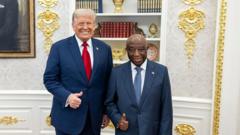The implications of Trump's aggressive tariff policy could reshape Brazil's political landscape and bolster Lula’s standing amidst Bolsonaro's challenges.
**Trump's Tariff Threat: A Political Gamble with Brazil's Future**

**Trump's Tariff Threat: A Political Gamble with Brazil's Future**
Trump's tariffs on Brazil may backfire politically for Bolsonaro, complicating both countries' relationships.
In a shocking political move, U.S. President Donald Trump announced potential tariffs on Brazil reaching as high as 50%, igniting a wave of repercussions across Latin America. His aggressive stance, which he justifies as a defense against perceived "attacks" on American technology firms, has plunged U.S.-Brazil relations to new lows, particularly affecting Jair Bolsonaro, who is under legal scrutiny for alleged election interference.
The context for these tariffs stems from escalating tensions between Trump and Brazil's current leader, Luiz Inácio Lula da Silva. Trump previously threatened members of the BRICS group, where Brazil plays a key role, accusing them of anti-American sentiment. Lula quickly countered the tariff threat via social media, asserting Brazil's autonomy and warning against U.S. dominance.
The announcement of the tariffs comes as Brazil's government grapples with its economic position, likely exploring retaliatory measures that could include tariffs on U.S. goods. However, questions loom over Brazil’s ability to withstand such an economic confrontation, raising the stakes for both countries.
Analysts suggest the tariffs could be interpreted as a direct endorsement for Bolsonaro. Trump’s letter criticizing Lula and supporting Bolsonaro amidst his legal troubles is seen as a lifeline for the former president, who while facing political bans, aims for a future comeback. Bolsonaro has garnered support from loyalists eager for reaffirmation from Trump, whose own political history demonstrates a penchant for disruption and loyalty.
However, the political climate is fraught with uncertainty, as the fallout from tariffs could extend to crucial sectors in Brazil closely tied to Bolsonaro's base, such as agribusiness. Fears over the potential impact on Brazilian commodities like beef and coffee exports loom large, especially given Brazil's reliance on these industries.
Unexpectedly, Trump's tariff threats may bolster Lula’s narrative of national sovereignty, potentially uniting disparate factions against foreign interference. Political analysts predict a rallying effect around Lula, as negative sentiment toward Trump among Brazilians could shift the blame for impending economic quandaries onto Bolsonaro's administration.
As Brazil heads toward presidential elections in 2026, this series of tariff threats has sparked intense debate, drawing parallels to recent political dramas in neighboring countries where populist candidates faced scrutiny. Bolsonaro, unable to run for re-election due to legal constraints, faces a more fragmented political opposition, raising questions about the next representative for Brazil’s right-wing faction.
In conclusion, Trump's intervention appears to create ripples not only in trade but also within Brazilian politics, placing both Bolsonaro’s future and Lula’s chances of gaining ground in a precarious balance. The impending response from Brazil highlights a turbulent geopolitical landscape, as the consequences of U.S. tariffs could redefine power dynamics in South America.





















